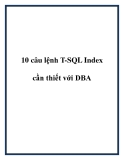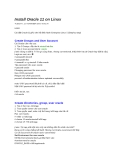
Database administrators
-
Trong quá trình sử dụng Joomla! nếu vì lý do nào đó mà bạn không thể đăng nhập vào hệ thống với tài khoản Super Administrator (tên mặc định: admin), bạn có thể dễ dàng thiết lập một mật khẩu mới (reset) thông qua một công cụ quản trị cơ sở dữ liệu (database) bất kỳ mà Hosting cung cấp. Công cụ thường được dùng là phpMyadmin.
 31p
31p  zoromatna
zoromatna
 14-08-2012
14-08-2012
 103
103
 10
10
 Download
Download
-
In the knowledge byte section, tell the students about how to use the copy database wizard to copy or move databases and related objects to a different database server or another SQL Server instance. When using the copy database wizard you must have database administrator permissions on both the source and destination servers. Also, ensure that the second instance of SQL Server is installed, with the name SERVER\SECOND.
 46p
46p  anhgau456
anhgau456
 25-11-2015
25-11-2015
 42
42
 3
3
 Download
Download
-
Lecture "Administration and visualization: Chapter 3.1 - Data modelling and databases" provides students with content about: Data model; Data modeling; Ralational data model; Data modeling process;... Please refer to the detailed content of the lecture!
 56p
56p  gaupanda031
gaupanda031
 20-05-2024
20-05-2024
 13
13
 4
4
 Download
Download
-
Lecture "Administration and visualization: Chapter 3.2 - Data modelling and databases OLTP & OLAP" provides students with content about: Overview; OLTP vs OLAP; Data warehouse modeling; Data warehouse design; Data warehouse Implementation;... Please refer to the detailed content of the lecture!
 71p
71p  gaupanda031
gaupanda031
 20-05-2024
20-05-2024
 7
7
 4
4
 Download
Download
-
10 câu lệnh T-SQL Index cần thiết với DBA .Những người SQL Server DBA (Database Administrator) – quản trị cơ sở dữ liệu biết rất rõ rằng các danh mục Index trong database rất giống với Index trong mục Library. Hoặc hiểu theo cách đơn giản rằng Index trong Database là 1 hệ cấu trúc có liên kết chặt chẽ với các bảng để nhanh chóng thu thập thông tin từ các dòng trong bảng đó.
 12p
12p  badaovl
badaovl
 18-05-2013
18-05-2013
 104
104
 7
7
 Download
Download
-
Cài Oracle cần như sau: 1. Tạo 2 Groups: đặc tên là oinstall và dba 2. Tạo 1 User account tên là: oracle (note: Đúng ra đặt là Tí Tèo gì củng được, nhưng conventional, thấy thiên hạ cài Oracle hay đặt là vậy.) Login as root, run: � # groupadd oinstall # groupadd dba # useradd -m -g oinstall -G dba oracle Tạo password cho user: oracle # passwd oracle Changing password for user oracle. New UNIX password: Retype new UNIX password: passwd: all authentication tokens updated successfully.
 7p
7p  gcsvpn
gcsvpn
 28-02-2013
28-02-2013
 65
65
 7
7
 Download
Download
-
Redundant Arrays of Inexpensive Disks Technology (RAID)
 12p
12p  trinh02
trinh02
 28-01-2013
28-01-2013
 58
58
 6
6
 Download
Download
-
Small shared pool Small database buffer cache Small redo log buffer cache Missing indexes Rollback segments and undo tablespace Sort area size incorrectly set Assorted
 16p
16p  trinh02
trinh02
 28-01-2013
28-01-2013
 57
57
 6
6
 Download
Download
-
After completing this lesson, you should be able to do the following: Use the Oracle tuning methodology to diagnose and resolve performance problems Use Oracle tools to diagnose performance problems Understand the goals of the workshop
 14p
14p  trinh02
trinh02
 28-01-2013
28-01-2013
 72
72
 5
5
 Download
Download
-
After completing this lesson, you should be able to do the following: Describe different system architectures Describe the primary steps of OS tuning Identify similarities between OS and DB tuning Understand virtual memory and paging Explain the difference between a process and a thread
 14p
14p  trinh02
trinh02
 28-01-2013
28-01-2013
 50
50
 5
5
 Download
Download
-
After completing this lesson, you should be able to do the following: Interpret the concept of a hierarchical query Create a tree-structured report Format hierarchical data Exclude branches from the tree structure
 18p
18p  trinh02
trinh02
 28-01-2013
28-01-2013
 48
48
 4
4
 Download
Download
-
Auditing If an unauthorized user is deleting data, then the DBA might decide to audit all connections to the database and all successful and unsuccessful deletions from all tables in the database. The DBA can gather statistics about which tables are being updated, how many logical inputs/outputs (I/Os) are performed, and how many concurrent users connect at peak times.
 16p
16p  trinh02
trinh02
 28-01-2013
28-01-2013
 52
52
 9
9
 Download
Download
-
After completing this lesson, you should be able use the following datetime functions: TZ_OFFSET CURRENT_DATE CURRENT_TIMESTAMP LOCALTIMESTAMP DBTIMEZONE SESSIONTIMEZONE EXTRACT FROM_TZ TO_TIMESTAMP TO_TIMESTAMP_TZ TO_YMINTERVAL
 20p
20p  trinh02
trinh02
 28-01-2013
28-01-2013
 51
51
 3
3
 Download
Download
-
Users and Security Security domain The database administrator defines the names of the users who are allowed to access a database. A security domain defines the settings that apply to the user. Authentication mechanism A user who requires access to the database can be authenticated by one of the following: Data dictionary Operating system Network The means of authentication is specified at the time the user is defined in the database and can be altered later. This lesson covers authentication by database and by operating system only.
 20p
20p  trinh02
trinh02
 28-01-2013
28-01-2013
 83
83
 3
3
 Download
Download
-
This workshop covers: Creating tables and sequences Modifying data in the tables Modifying table definitions Creating views Writing scripts containing SQL and iSQL*Plus commands Generating a simple report
 14p
14p  trinh02
trinh02
 28-01-2013
28-01-2013
 74
74
 4
4
 Download
Download
-
After completing this lesson, you should be able to do the following: Identify issues associated with managing users in an Oracle Shared Server environment Configure the Oracle Shared Server environment to optimize performance Diagnose and resolve performance issues with Oracle Shared Server processes
 14p
14p  trinh02
trinh02
 28-01-2013
28-01-2013
 61
61
 5
5
 Download
Download
-
After completing this lesson, you should be able to do the following: Monitor and size the redo log buffer Monitor and size the Java pool Control the amount of Java session memory used by a session
 16p
16p  trinh02
trinh02
 28-01-2013
28-01-2013
 52
52
 5
5
 Download
Download
-
Control File The control file is a small binary file necessary for the database to start and operate successfully. Each control file is associated with only one Oracle database. Before a database is opened, the control file is read to determine whether the database is in a valid state to use. A control file is updated continuously by the Oracle server during database use, so it must be available for writing whenever the database is open. The information in the control file can be modified only by the Oracle server; no database administrator or end user can edit the control file....
 16p
16p  trinh02
trinh02
 28-01-2013
28-01-2013
 61
61
 3
3
 Download
Download
-
After completing this lesson, you should be able to do the following: Implement dynamic SGA allocation Dynamically adjust the buffer caches Dynamically adjust the shared pool
 12p
12p  trinh02
trinh02
 28-01-2013
28-01-2013
 36
36
 5
5
 Download
Download
-
Built-In Database Objects In addition to creating the database files, several other structures are created. Data dictionary: Contains descriptions of the objects in the database Dynamic performance tables: Contains information used by the database administrator (DBA) to monitor and tune the database and instance PL/SQL packages: Program units adding functionality to the database. These packages are created when the catproc.sql script is run after the CREATE DATABASE command. PL/SQL packages will not be discussed within the scope of this course.
 20p
20p  trinh02
trinh02
 28-01-2013
28-01-2013
 66
66
 4
4
 Download
Download
CHỦ ĐỀ BẠN MUỐN TÌM
































